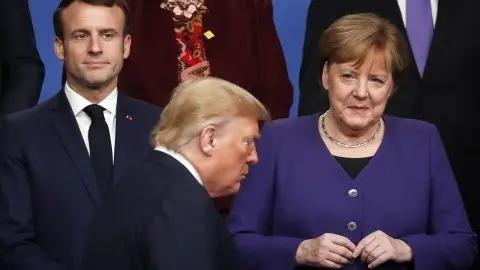Brexit: It’s still all to play for in the UK’s election
Markets are primed for a Conservative majority when UK voters head to the ballot box. But a week is a long time in politics, and a hung parliament definitely can't be ruled out. Whatever happens, 2020 looks set to be another uncertain year for Brexit and the UK economy
A week is a long time in British politics
With a week to go until the UK election on 12 December, you’d be forgiven for feeling a sense of déjà vu.
Markets are increasingly positioning for a Conservative majority outcome, following a number of polls showing prime minister Boris Johnson’s party is consolidating their lead. A closely-watched YouGov polling model recently predicted the Conservatives could secure a solid 69 majority.
Betting company PaddyPower betting odds imply a 73% probability of a Conservative majority, while our FX team believes there is now a 2% positive risk premium in sterling relative to the euro. This implies that investors are already pricing a market-friendly outcome.
But as we learnt back in 2017, a week is a long time in politics. There is still plenty of time for things to go wrong for PM Johnson’s party, and markets may be underestimating the risk of another hung parliament.
Conservatives and Labour consolidating their poll positions

Conservative majority likely, but don't rule out another hung parliament
In a trend reminiscent of the previous election, the opposition Labour party has gained ground in the most recent polls. According to the FT’s tracker, Labour is now up at 32% in the polls – admittedly still 10 points behind the Conservatives, but noticeably higher than the 25% level the party was tracking through most of the second half of the year.
Where the Conservatives have benefitted from the Brexit party’s retreat, Labour has been helped by the downfall of the Lib Dems, whose ‘revoke’ Article 50 policy hasn’t resonated as much as hoped among voters.
That said, one key difference between this and the previous election is that Labour leader Jeremy Corbyn’s favorability rating has fallen significantly. And while Labour’s bold policy proposals will resonate in key battlegrounds, some recent polling for The Times suggested voters aren’t all convinced that the party’s pledges are deliverable.
But even so, the polls may not need to narrow much for the balance to swing back towards a hung parliament. As a rule of thumb, pollsters reckon the gap between the two major parties would need to narrow to six points or less over the final few days.
One way this might happen is via shifts in turnout – the notoriously unpredictable part of any polling model. With the Conservatives ahead in the polls, there is a chance that their target voters become complacent – around a third of the electorate believes a Conservative majority is the most likely outcome according to Ipsos MORI. Only 10% expect a Labour majority government.
The recent YouGov MRP model indicated that the majority of seats projected to be gained by the Conservatives would be tight. It therefore probably wouldn’t take massive changes in turnout to generate quite a different outcome at next week's election.
Seven scenarios for Brexit after the UK election
2020 set to be another choppy year for Brexit and the UK economy
The bottom line is that, while a Conservative majority is undoubtedly the most likely scenario, it is far from guaranteed. But whatever the outcome, we think the uncertain political climate will continue to weigh on economic activity as we head into 2020. For instance, even if the Brexit deal is ratified early next year, concerns about the length of the standstill transition period will quickly resurface.
This is particularly true if the Conservatives gain only a small majority at the election. PM Johnson will be under heavy pressure from the hardline pro-Brexit lawmakers within his party not to extend further.
There are already early signs that the ongoing uncertainty and persistent sluggishness of UK growth could be translating into something more worrying. Admittedly the activity numbers have been volatile over recent months, thrown around by stock building activity among other things. But investment has been consistently weak, and there are early signs that the resulting fall in order levels is beginning to noticeably reduce hiring appetite among firms.
So whatever happens at next week's UK election, 2020 looks set to be another turbulent year for the Brexit process and UK economy.
This publication has been prepared by ING solely for information purposes irrespective of a particular user's means, financial situation or investment objectives. The information does not constitute investment recommendation, and nor is it investment, legal or tax advice or an offer or solicitation to purchase or sell any financial instrument. Read more
Download
Download article
5 December 2019
December Economic Update:Prepare to be disappointed in 2020 This bundle contains 9 Articles